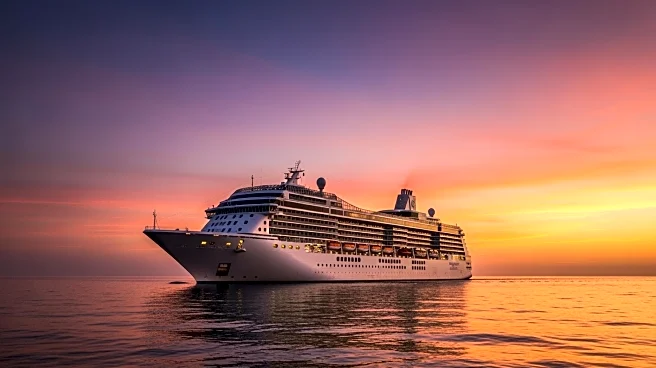What's Happening?
The cruise industry is set to experience significant growth in 2026, with AAA projecting a record-breaking year for passenger volumes. According to AAA, 21.7 million Americans are expected to embark on ocean
cruises in 2026, marking a 4.5% increase from the 20.7 million passengers in 2025. This growth follows an 8.4% increase from 2024 to 2025. The rising popularity of cruises among U.S. travelers is attributed to the appeal of diverse destinations, convenience, and the value offered by cruise vacations. Stacey Barber, Vice President of AAA Travel, notes the increasing demand for ocean cruises as travelers seek memorable vacation experiences. The demographic of cruise passengers is diverse, with 65% aged 55 and older, 27% aged 35-54, and 7% aged 18-34. Cruises are particularly popular in the Caribbean, Mediterranean, and Northern Europe, with mega vessels offering extensive amenities.
Why It's Important?
The projected growth in the cruise industry is significant for several reasons. It highlights a shift in travel preferences among Americans, with more opting for cruises as a vacation choice. This trend could have substantial economic implications, benefiting the tourism sector and related industries such as hospitality and transportation. The increase in cruise passengers may lead to more job opportunities and economic activity in port cities and regions popular with cruise travelers. Additionally, the popularity of cruises underscores the importance of the industry in providing affordable and diverse vacation options, which can contribute to overall consumer satisfaction and spending. The high satisfaction rates among cruise passengers, with 90% rating their experiences as very good or good, further emphasize the industry's role in shaping travel trends.
What's Next?
As the cruise industry anticipates growth, stakeholders such as cruise lines and travel agencies are likely to focus on expanding their offerings and improving customer experiences. This may include investing in larger and more luxurious vessels, enhancing onboard amenities, and diversifying destination options. Travel agencies, including AAA, are expected to play a crucial role in facilitating bookings and providing travel advice, ensuring passengers receive the best value for their cruise vacations. The industry may also see increased competition among cruise lines, prompting innovations in service and pricing strategies. Additionally, the forecasted growth could lead to infrastructure developments in port cities to accommodate the rising number of cruise passengers.
Beyond the Headlines
The growth in the cruise industry may have broader implications for environmental sustainability. As more Americans choose cruises, there could be increased scrutiny on the environmental impact of large vessels, particularly concerning emissions and waste management. Cruise lines may face pressure to adopt greener practices and technologies to minimize their ecological footprint. Furthermore, the industry's expansion could influence cultural exchanges, as travelers explore diverse destinations and interact with different communities. This cultural dimension may enhance global understanding and appreciation, fostering positive international relations.











